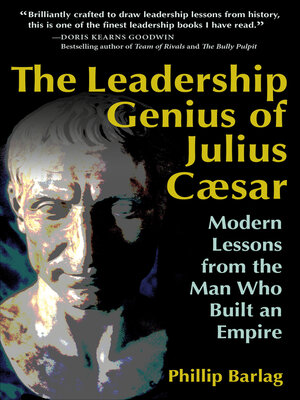The Leadership Genius of Julius Caesar
ebook ∣ Modern Lessons from the Man Who Built an Empire
By Phillip Barlag

Sign up to save your library
With an OverDrive account, you can save your favorite libraries for at-a-glance information about availability. Find out more about OverDrive accounts.
Find this title in Libby, the library reading app by OverDrive.



Search for a digital library with this title
Title found at these libraries:
| Library Name | Distance |
|---|---|
| Loading... |
"Brilliantly crafted to draw leadership lessons from history, this is one of the finest leadership books I have read" (Doris Kearns Goodwin, author of Team of Rivals).
Leaders are always trying to get better, but sometimes the best way to move forward is to look back. Philip Barlag shows us that Julius Caesar is one of the most compelling leaders of the past to study—a man whose approach was surprisingly modern and extraordinarily effective. Caesar proved by his words and deeds that he never considered himself above the average Roman citizen. He had an amazing ability to generate loyalty, to turn enemies into allies and allies into devoted followers.
Barlag uses dramatic and colorful incidents from Caesar's career—being held hostage by pirates, charging alone into enemy lines, pardoning people he knew wanted him dead—to illustrate what Caesar can teach leaders today. Central to Barlag's argument is the distinction between force and power. Caesar avoided using brute force on his followers. Instead, he won their loyalty through personal integrity and understanding his people's needs and motivations. Thousands of years after Caesar's death, this is still the kind of loyalty every leader wants to inspire.
Leaders are always trying to get better, but sometimes the best way to move forward is to look back. Philip Barlag shows us that Julius Caesar is one of the most compelling leaders of the past to study—a man whose approach was surprisingly modern and extraordinarily effective. Caesar proved by his words and deeds that he never considered himself above the average Roman citizen. He had an amazing ability to generate loyalty, to turn enemies into allies and allies into devoted followers.
Barlag uses dramatic and colorful incidents from Caesar's career—being held hostage by pirates, charging alone into enemy lines, pardoning people he knew wanted him dead—to illustrate what Caesar can teach leaders today. Central to Barlag's argument is the distinction between force and power. Caesar avoided using brute force on his followers. Instead, he won their loyalty through personal integrity and understanding his people's needs and motivations. Thousands of years after Caesar's death, this is still the kind of loyalty every leader wants to inspire.







